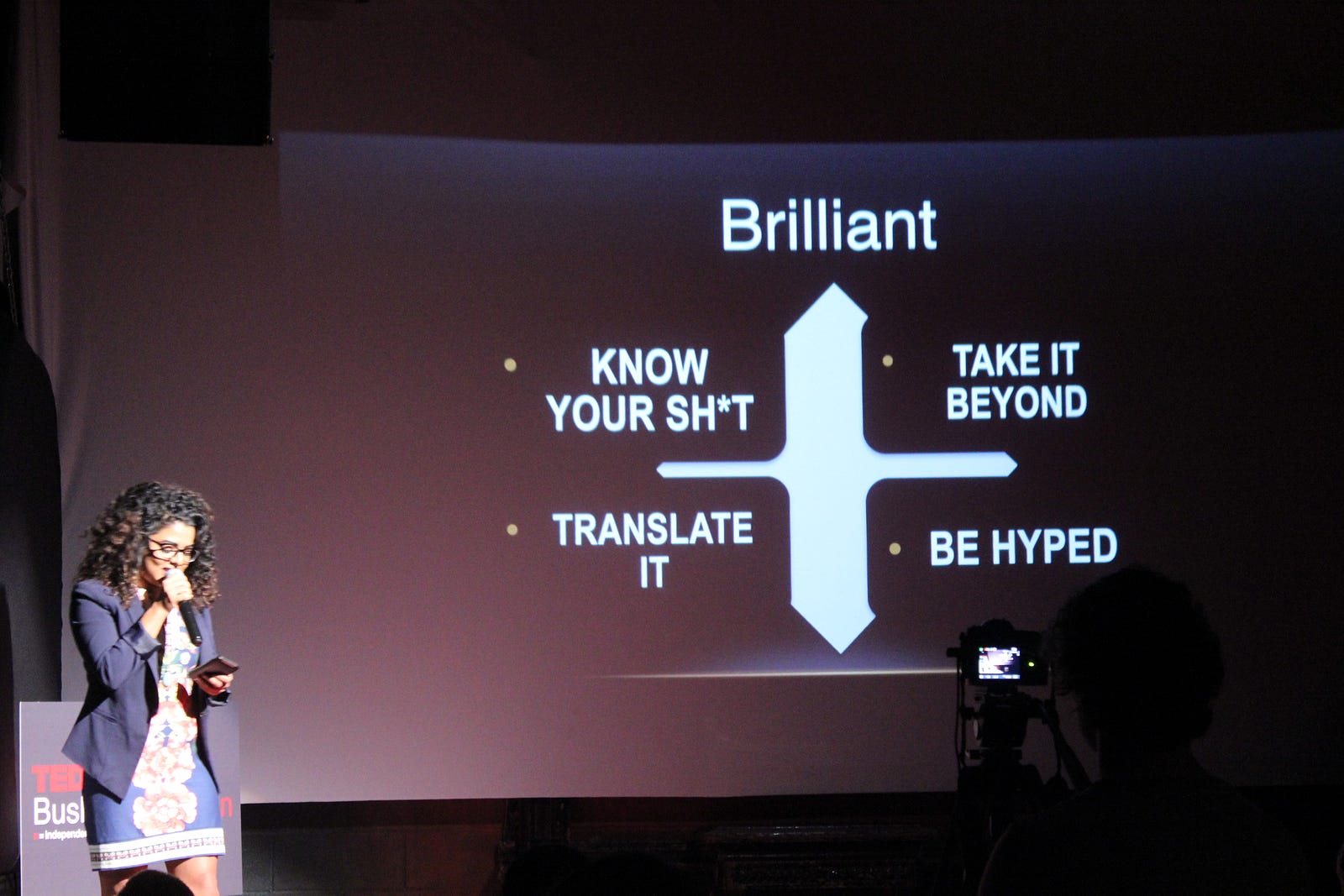By Dani Slocki
Once a year Kweighbaye Kotee organizes TedX Bushwick Women. The three hour conference is to inform, empower, and connect with girls, women, and female identifiers on how to create change. The program was curated with a diverse panel of women, featuring clips from Ted Talks and ending with networking drinks to unite Bushwick’s community of innovators and dreamers.
This year, the lineup included Bushwick-based veterans, assemblywomen, heads within the UN, detectives, entrepreneurs, cancer survivors, professors, and others with the mission to debunk stigmas, “build bridges” and inspire all people to spark the change we want to see within our systems.
Speaker Sarah Lux-Lee, mother and founder of Mindr, delivered compelling facts from the Federal Reserve on workforce prejudices against working mothers. Statistically mothers make $11K less than other women. When analyzing all parents, mothers make 71 cents to every dollar a father would make. Both are parents yet mothers are viewed as forgetful, incompetent, and preoccupied when in fact they are more qualified and productive than all other counter parts. Being a mother trains women to be more cognizant, effectively multitask, and better resolve highly stressful situations with screaming subordinates which makes them stronger leaders. In short Lux-Lee calls mothers the ultimate ninjas.
So why the bias?
Kotee curated a lineup of Bushwick veterans, assemblywomen, heads within the UN, detectives, entrepreneurs, cancer survivors, professors, and others with the mission to debunk stigmas, “build bridges” and inspire all people to spark the change we want to see within our systems, not just women.
Michelle King, Head of the UN Women’s Integrate Strategy and Partnerships for Innovations, shares her observation of women’s self-help books vs men’s. Books targeted towards women to “Lean in” and “Man Up” suggest how women can get a “leg up” in a male dominated workforce. Frustrated by these readings the young journalist wanted to go to the greatest source she could think of for self-help, the Dalai Lama. During an interview, she asked who she should look to as a role model. The Dalai shaking his head said, “no role model, go within”. He taught her that she has everything she needs to be successful. Fear and insecurity from our conditioning teaches us otherwise.. Our society is fixated on keeping the man’s world intact, rather than adapting to the evolving workforce.
Understanding these outdated societal norms, can we impact systematic change?
Assemblywoman Maritza Davila saw an unpaved path and started to clear the way for others. Davila was born in Puerto Rico and raised in Bushwick. When she became a young mother, she saw her community with a new perspective. She no longer could accept the broken systems she once overlooked. Tired by the crimes occurring outside her building and inhospitable living situations inside, she mustered up the courage to spread her message. Davila went knocking on the doors in her building to get support, and she discovered that 6 out of the 7 apartments were occupied by single mothers. Now Davila was ready to "get shit done," and these women did. Inspired and empowered by her own inner strength Davila ran for assemblywoman for her district years later. She worked relentlessly in Albany and "did a lot of good for a lot of people," but still, she also saw how misrepresented urban women were in politics. She came across women of color, Hasidic, and Asian women with little to no representation in house. Again, she rallied a group to back up her message. The only thing in her way was a "yes" from the governor to create a Urban Women of the Assembly group to properly advocate for the underrepresented. Her team was concerned about what the governor's response would be, and Davila debated whether to petition for a special division, but ultimately she put her fear aside and asked anyway. To everyone's surprise the governor gave them the okay without hesitation, knowing these women face real challenges that are overlooked.
What were these women scared of? Why weren’t all people already represented in authoritarian positions?
There were two breaks at the TedX during which attendees could mingle with speakers and connect with others. I could hear the excitement grow and by the second break we saw the structure of the panel come to life. Identify, dissect, create solutions. The same questions were buzzing around the room and then Aditi Paul, Assistant Professor at Pace University put those bubbling questions to rest. Paul noticed a bias within the education system, specifically students’ preconception of foreign female professors, which impacts their ability to teach and for students to learn. This threatens her career and their grades. Paul conducted a 70-student survey to uncover the “Paradox of Academia”. What moved them were 4 factors, shown in the image below.

Paul went on to dissect every point in a detailed PowerPoint that was both comical and informative. In short, Paul is an amazing educator but studies show her accent and gender hinder her from being viewed as relatable and “knowing her shit” which most students said makes a good professor.
Now that we know the logic is flawed, what should we do?
In the words of Nanu Wan, “be the domino”. If you don’t like what you see or want more, act now. Be the first piece to cause the ripple effect. “Your silence serves no one” and if you’re ever questioning if you should act, ask yourself these questions:
- Do you mean it?
- Is it true?
- Do you say this with love?
If yes, then get out there and challenge the system, encourage change. If you need encouragement just remember the TedX program is based on the commissioned independent forum Terry Talks. Women have been influencing history behind the scenes for years, it’s time to emerge sisters.